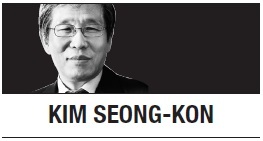A few days ago, I watched 2013 Hollywood action thriller movie “Olympus Has Fallen” on TV. It was the third time I watched the Antoine Paqua film, and yet it was still deeply unnerving. The film brings to life a nearly implausible scenario because such a large scale air and ground attack by North Korean terrorists on the White House is almost impossible. North Korean nationals are not allowed to enter the United States in the first place, except for UN delegates. The film also seems to assume that South Korea, like Japan and many other countries, has a parliamentary cabinet system that gives power to preside over the nation to the prime minister, not the president.
If the above is true, viewers will be disappointed in Americans’ indifference to and ignorance of South Korea. It is also disheartening if the newspaper reports are true that a high-ranking White House official recently referred to South Korea as South Africa. Although it must have been a slip of the tongue, it still would dismay the Korean people because it surely indicated America’s lack of interest in and knowledge of South Korea. Perhaps the US government is only interested in the immediate threat from the nuclear missiles of North Korea.
Yet those things are minor compared to more troubling things the film suggests and exposes. First, if North Koreans cannot come to the States, who are the terrorists who attack the White House in the film? Are those terrorists Korean-Americans or South Koreans who subscribe to the political ideology of North Korea?
It may be true that some Korean-Americans are North Korean sympathizers who can be used and manipulated for North Korea’s propaganda. Nevertheless, few of them would be extreme or radical enough to attack the White House. Still, however, the idea of the “enemy within” appalls viewers. It is undeniable that even in South Korea, there may lurk quite a few North Korea sympathizers. In the movie, the terrorists are led by Kang Yeon-sak, head of the South Korean prime minister’s security detail, who is obviously also one of the enemies within.
The second troubling thing is the terrorists’ firm conviction that they work for justice. To US President Benjamin Asher’s question, “Are you from North Korea?” Kang answers, “It doesn’t matter. I work for justice.” Listening to his answer, viewers come to realize that “justice” is a complex term that can be manipulated even by terrorists. Kang also strongly asserts that US intervention hampers peace and the unification of the Korean Peninsula. We all know that this is a familiar propaganda point of North Korea designed to make the US government pull out US troops from South Korea so North Korea can take over the peninsula. Viewers also come to realize that “peace,” too, is another tricky word when used by North Korean politicians.
The third troubling thing comes when terrorist Kang forces US President Asher to pull back the 7th Fleet in the Pacific Ocean and the US Army from South Korea, stubbornly insisting it would bring peace to the Korean Peninsula. At an emergency meeting held at the Pentagon, a high-ranking US government official predicts that if that happens, South Korea will be occupied by the North within 72 hours. During the Korean War, it took about one to two months for North Korea to occupy the South, except for the Nakdong River and Busan area. Now, considering the speed of the computer age, the screenwriter must have thought it would take only three days. That cannot be true, and yet it surely must have made Korean viewers uneasy and uncomfortable.
Recently, US President Donald Trump designated North Korea a “clear and present danger” to the United States. Experts know that phrase is a serious warning the US government is authorized to exert any radical measures in order to stop North Korean aggressions if necessary. In 1919, US Supreme Court Justice Oliver Wendell Holmes upheld the conviction of a Socialist Party member who instigated a boycott of the World War I draft. Justice Holmes declared that if it was a clear and present danger to the US, the government could revoke even freedom of speech.
In his novel “The Crying of Lot 49,” Thomas Pynchon writes that we now live in the state of 49, waiting for 50, which is Pentecost in Greek. Pynchon warns us that when stage 50 finally arrives, we will be either saved or doomed. It is totally up to us, says Pynchon, whether to choose salvation or annihilation.
As Pynchon suggests, we are now living in a pending period of 49, waiting for the revelation of our destiny. Depending on our choice, we can either prosper or perish. The bidding has begun already. Surely, this is a difficult time for all of us.
By Kim Seong-kon
Kim Seong-kon is a professor emeritus of English at Seoul National University and president of the Literature Translation Institute of Korea. He can be reached at sukim@snu.ac.kr. -- Ed.

![[AtoZ into Korean mind] Humor in Korea: Navigating the line between what's funny and not](http://res.heraldm.com/phpwas/restmb_idxmake.php?idx=645&simg=/content/image/2024/04/22/20240422050642_0.jpg&u=)
![[Exclusive] Korean military set to ban iPhones over 'security' concerns](http://res.heraldm.com/phpwas/restmb_idxmake.php?idx=645&simg=/content/image/2024/04/23/20240423050599_0.jpg&u=20240423183955)



![[Graphic News] 77% of young Koreans still financially dependent](http://res.heraldm.com/phpwas/restmb_idxmake.php?idx=645&simg=/content/image/2024/04/22/20240422050762_0.gif&u=)